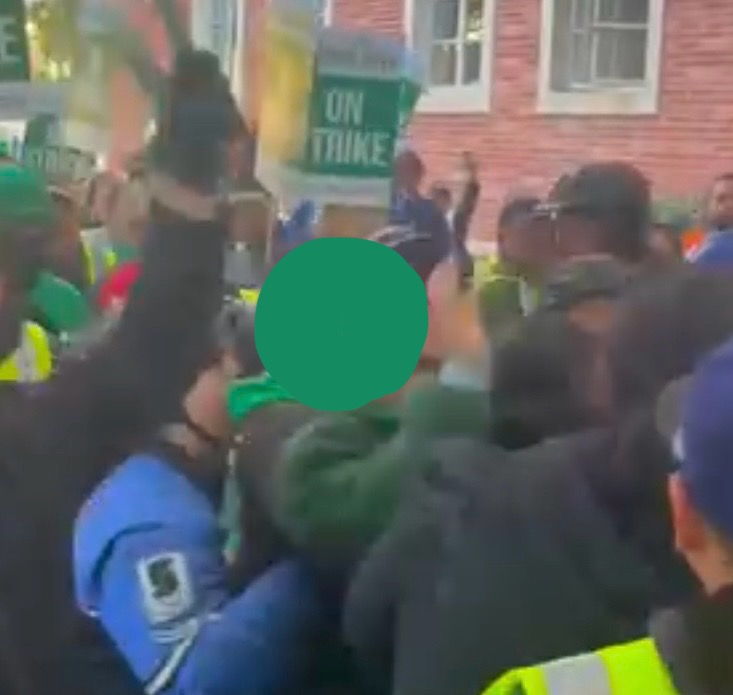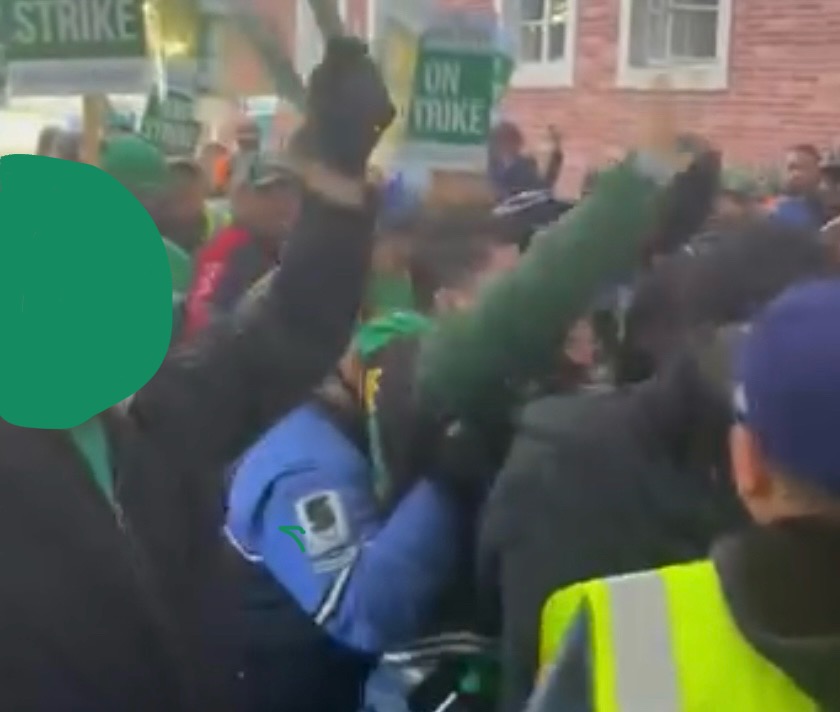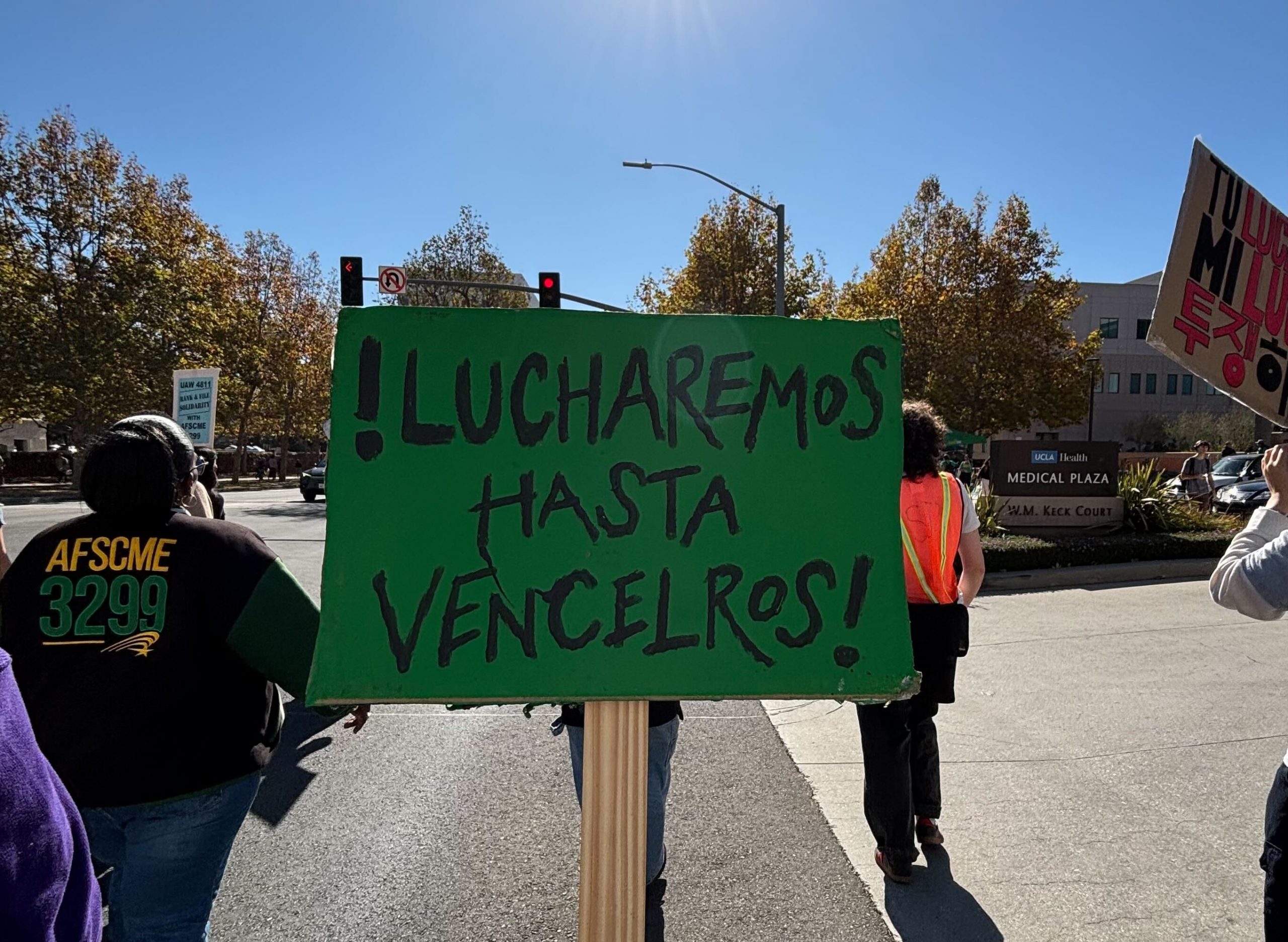Courtesy of Joey (he/him), a third-year Environmental Science major and SLAP member.
Co-written by Ariana Castro (she/her) and Ember Ireland (they/xe).
“Students and workers unite! One struggle, one fight!”
“Money for jobs and education — not for war and occupation!”
These were among the chants reverberating across UCLA’s campus and the streets of Westwood, sung proudly by AFSCME 3299 workers and picketing students on Nov. 20 and 21.
AFSCME Local 3299, founded in 1948, is a division of the American Federation of State, County and Municipal Employees Union that encompasses the University of California’s campuses, medical centers, clinics, and research laboratories. The UC system is the third-largest employer in the state of California. Local 3299 is the UC’s largest employee union representing an undaunted force of over 37,000 career workers
AFSCME 3299 represents food service workers, custodial workers, and patient care workers, but not ASUCLA student workers — UC policy undermines attempts to unionize undergraduate student workers. Many of the AFSCME workers on strike have worked at UCLA for 20 years or more.
Daisy, a custodial worker in Ackerman Union, voiced the inequities faced by workers in her profession: “Workers need money [and] have a family, and [that’s] not fair, working hard, […] 20 years here; I give you my whole life.”
The UC: Bad Bargainer and Greedy Employer
Existing UC contracts for service workers expired last month on Oct. 31, and contracts for patient care workers expired in the summer, on July 31. The UC allegedly failed to negotiate equitable successor contracts, withholding information on staff vacancies and relevant financial information.
Instead, the UC announced that it will raise employee healthcare costs by up to 11 percent on Jan. 1, 2025, surpassing California’s 2023 inflation rate of 3.9 percent, allegedly without bringing this decision to a bargaining table. It will also require employees and retirees to pay monthly premiums for CORE PPO, an equitable health plan that did not previously demand monthly premiums.
“By refusing to bargain in good faith, the University has made it clear that it does not value the frontline workers who clean its facilities, serve students food, and treat patients,” said AFSCME Local 3299 President Michael Avant. “If UC refuses to meet its most basic legal responsibilities to employees, we will hold them accountable by exercising our legal right to strike.”
As such, Local 3299 voted on Oct. 31 to authorize an Unfair Labor Practice (ULP) Strike against the university with 99% of its members in favor of the action. This decision follows formal charges filed on Oct. 10 with California’s Public Employment Relations Board (PERB) alleging the UC violated the Higher Education Employer-Employee Relations Act (HEERA) with illegal bad faith bargaining.
UC’s investment of $4 billion in Blackstone has prevented workers from living near their campus of employment. Blackstone is the largest private equity firm and commercial real estate company in the world, managing more than $1.1 trillion in various assets. It is our nation’s largest landlord; with almost 350,000 units of rental housing in its possession, Blackstone facilitates rent increases, poor conditions, and evictions to prioritize profit for investors.
The company displaces lower-income residents, including UC workers who face low wages. Throughout San Diego County, including properties near UC San Diego, Blackstone acquired 5,800 units of rental housing and has raised rent between 43% and 64% in two years, contributing to homelessness in the area.
One food service worker at Bruin Plate, who has worked at UCLA on and off for 24 years, is a single mother of grown children and drives an hour and 15 minutes to reach campus. Her niece, nephew, and son all also work at UCLA. Her situation is not unique; many UC workers drive multiple hours to and from work every day. UC workers from various campuses and hospitals have resorted to sleeping in their cars because of multi-hour commutes. Exacerbating the cost of transportation, UCLA has raised parking permit costs.
Local 3299 has bargained with the UC to
- Institute a $25,000 housing fund for rent and mortgage assistance for workers.
- Have access to low-interest housing loans.
- Divest from Blackstone and invest in affordable housing.
- Lower parking costs.
The UC has responded without proposals to the union’s equitable housing demands or any initiative to decrease worker parking rates. The AFSCME strike aimed to address these issues.
Jarringly, the UC Regents agreed to raise chancellors’ salaries by around 30% via private sources. Salaries for UC chancellors now range from $785,000 to $1.2 million. Simultaneously, Board of Regents has approved a tuition hike for out-of-state and international students to raise revenue.
The board also approved requests to finance growing supplies of military equipment for the UCPD following the destruction of the Pro-Palestine Solidarity Encampment last Spring, including increasing stocks of pepper balls, sponge grenades, and drones. In addition to militarizing its campuses, the UC continues to invest $32 billion in weapons manufacturers that fuel the ongoing genocide in Gaza.
While funneling billions of dollars into weapons, occupation, displacement, and the pockets of chancellors, the UC continues to hike out-of-state tuition costs and claims it can’t afford to support its workers and students’ needs.
AFSCME 3299 on Strike!
On Nov. 20 and 21, Local 3299 workers picketed in front of the Ronald Reagan Medical Hospital, Luskin Conference Center, and at Bruin Plaza from 6 a.m. to 6 p.m. Across the UC campuses, more than 37,000 workers joined the AFSCME picket lines. Students demonstrated in solidarity, mobilized by the Student Labor Advocacy Project (SLAP) at UCLA.
SLAP organized a Strike Solidarity Walkout on Thursday, Nov. 21 at 10:30 a.m. in collaboration with 14 student, faculty, and LA organizations. The walkout sought “to support the strike and show the UC that students and workers demand money and jobs for education, not for war and occupation.”
Students gathered first at Dickinson Plaza, where various student organization representatives and faculty spoke on the intersections of challenges faced by UC career workers and students. Speakers shared personal stories and labor statistics that highlighted ways in which the UC’s neglect of its employees is linked to the historical exploitation and struggles of immigrant workers in the U.S. They admonished the university’s use of Blackstone as an asset manager and the devastating genocide of the Palestinian people.
“We [ASUCLA student workers] are exempt from a lot of the minimum wage [requirements] here, and it’s really sad to see students … beg for overtime because they literally can’t afford to live without working 30 hours a week,” said Joey (he/him), a third-year Environmental Science major and member of SLAP who worked at Taco Bell in his freshman year and is currently employed at Rendezvous dining hall.
Following the speeches, the Strike Solidarity Walkout contingent set out to Bruin Walk and urged students to “unite, walk out and join the fight.” The contingent met with picketing workers at Bruin Plaza. As a combined unit, students and workers marched across the lanes of Westwood Plaza until just past the Ronald Reagan Medical Center, blocking traffic in a display of union power.
Local 3299 provided hot food and drinks to union members and student allies alike at tents in front of Ronald Reagan Medical Center. Throughout the walkout, community members passed out free KN95 and N95 masks to prevent the spread of COVID-19 and protect the health of those on strike.
For Tamika, a food service worker at Cafe 1919 for 18 years, being on strike is a fight to ensure her colleagues are treated with dignity and paid what they deserve. Tamika’s wife is a construction manager and thus is able to support their family, but she knows this is not the case for many of her coworkers. Tamika was on strike to “fight for them as well.” She said, “We deserve much more than what UC has given us, and we’re here for you guys, and we come even though stuff is messed up, but we still come here to service you guys. You guys make us come to work, and I love doin’ my job.”


Caption: Stills from a video of the 8:30 a.m. altercation on Thursday, Nov. 21, in which CSC security, donning black and blue uniforms and bicycle helmets, physically handled and shoved AFSCME 3299 members wearing the green and yellow colors of their union outside the entrance of Murphy Hall. Some striking members hold signs that indicate “AFSCME 3299 On Strike: Unfair Labor Practice.” Courtesy of Joey’s footage.
Institutional Pushback and Resilient Bargaining
The two-day strike was not met without pushback. At around 8:30 a.m. on Thursday, Nov. 21, Local 3299 members picketed outside of Murphy Hall, where they experienced an altercation with aggressive Contemporary Services Corporation (CSC) security guards hired by UCLA.
“They shoved me and some of the career workers and union members [already] inside … And then when people fought back, they got even more violent with us,” said Joey. “[I] saw a couple people get thrown to the floor. One person got their finger cut pretty deep. And it’s just really scary to see that they don’t care about their workers and even students that were part of it … They started shoving everyone forward with their bicycles, too.”
He observed that respecting the union’s right to strike peacefully could have prevented the altercation. “You [CSC security] could have just let people like the union workers go inside and say their piece and then walk out in a peaceful way, but no, you had to shove everyone to the side and make it violent.”
Under Section 13 of the National Labor Relations Act (NRLA), no force should “interfere with or impede or diminish in any way the right to strike or to affect the limitations or qualifications on that right.” By proxy of CSC security, the university violated the national rights and protections of Local 3299 members on strike.
Labor actions like the AFSCME’s strike aim to pressure institutions to bargain in good faith with workers. The UC repeatedly denies accusations of bad faith bargaining, instead painting workers’ demands as exorbitant and unreasonable, even sending mass emails out in order to pit students against workers. Five days before the strike, the UC published its Economic Offers for AFSCME Employees Enhance Wages and Benefits and blamed the union for “declaring impasse.”
The UC has continued to offer inadequate wage raises and updates to sibling contracts, like UAW 4811, which represents graduate student workers. UC Berkeley Rank and File, a collective of rank and file organizers in UC Berkeley, discussed how a tentative agreement from the UC “puts our union in an unstrategic position for major contract negotiations, undermines our union’s democratic bargaining practices, and offers no significant material benefits to us as rank-and-file workers.”
Alma, a food service worker at UCLA for 20 years, expressed a deep sense of optimism and determination for Local 3299’s negotiations. “I hope this strike is all we need to get our contract, but if it’s not enough we will do it again because we have to fight for our rights and all we want is to have a better life for ourselves and for our families.”
While there are no updates on the contract for AFSCME workers and PERB has yet to release their ULP decision, UC employees are determined to fight for their rights to be upheld in the workplace. Every day without a contract is a day unprotected.
—
NOTE: Additional supporting organizations of the Student Solidarity Walkout include the UCLA Divest Coalition, Students for Farm Workers at UCLA, Compas at UCLA, Students for Justice in Palestine at UCLA, Faculty for Justice in Palestine at UCLA, UCLA Rank and File for a Democratic Union, Koreans for Decolonization at UCLA, PUSO West LA, UCLA Asian Pacific Coalition, Anakbayan UCLA, Samahang Pilipino, Jewish Voice for Peace UCLA, Young Democratic Socialists of America at UCLA, and Students for Socialism at UCLA.

